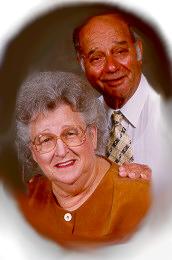Jerome Rihn


When were you born and
where?
I was born on October 30, 1927 in Hondo, Texas, in a small hospital, which is still there today.
Did you have any brothers or sisters? If so did
they live with you? Who lived with you at this time?
I had a total
of nine sisters and two brothers. For a total of 12 in the whole family, 14 with mom
and dad. We all lived togther in the same house. Only eight sisters and me are
surviving now.
Were you the oldest child and if so what were your
responsibilities?
I was the oldest son but not the oldest child. My
sister was the oldest, but she passed away when she was 13 from appendicitis. I
was the oldest son, so my responsibilities were helping my father with chores on
the farm. I helped him milk the cows early in the morning before school and
after school. I also cultivated the farm with a couple of mules and a plow. I
drove the tractor on the farm too, that was always fun!!
Did you
work druing the Depression, if yes where? If not, why?
No, I
didn't really work during the Depression, I was going to school at the time. My
dad needed my help on the farm, so that was my job.
What were the
wages like for a working day?
Farm wages were real cheap, I
remember some guys working all day and only getting about one to one and half dollars a
day, working from morning to night. My father charged two cents a bushel of corn
and five cents a for a bale of hay. It was tough in those days for people to get
by.
How much was food during the 1930's and how hard was it to
get?
Food wasn't scarce but it was harder to buy because people
didn't have the money they use to have. Income is awfully meager compared to
what it is now. Of course we had to buy the staples like flower and sugar, but since we
lived on the farm we had many of the necessities like meat, milk, butter and
cream. Living on a farm you had it better, when it came to food supply, than the
city folk.
What are some things different in your life today as
opposed to the 1930's?
There are many things that have changed, the
main one is transportation. Not many people traveled by air. Only the Air Force
were really flying. Then there was motor transportation. The cars are so much
faster today. When you went for a drive you had to carry many patches with you
because you got many flats, even driving just short distances. The living
conditions are much more better today because we have more money now to buy the
things we need. You can go to the bank and borrow money easier now than you
could back than. It was almost unheard of for people to go and ask for money.
People today don't realize how hard it was for us during this time. Things are
a hundred times better now than during the Depresstion days.
Where did you go to school?
Yes I went to school in Castroville at the St. Louis school. And when we moved in 1939 to LaCoste I went to
the LaCoste school, which is now know as Medina Valley.
I know
you were just a child during this time, but what was your fondest memory? What
did you do for fun? Did you have many toys? If so what?
The fondest
memory for me would have to be Christmas time. Our folks would have my aunts and
uncles over and they would bring gifts. Which we didn't get a lot of because we
didn't have much money. We didn't have many toys, our toys were tools around the
farm, such as the barrel where we would haul wood from one place to another. And
as far as games went we would play hide and seek, or kick the bucket. My brother
and I loved baseball, we played any chance we got. But mostly we did chores
around the house during the week. Sunday was our day off to play
around.
Were you ever scared? Did you ever lose anyone or anything
close to you?
I was scared like a normal kid of simple thunder
storms, but we were so young that we didn't realize what was going on. I lost my
oldest sister, which I can barely remember, when I was in the first grade. I can
remember one time her talking to her friends, but that's about it. I was about five
and she was about 12. It is quit a shock losing your sister at a very young
age.
LaCoste This site was done by Mr. Hines' History students, Tiffany Lopez and Liesl Schauer, in 2001. Although it talks about all of LaCoste and it's history, look at the Rihn's Place. This is Jerones family buiness, which his son runs now.
Castroville Also done by Mr. Rhine history studens. Tells about Castroville and it's history. Look at St. Louis, where Jerome went to school. appendicitis This site shows whats this illness is and how you get it.